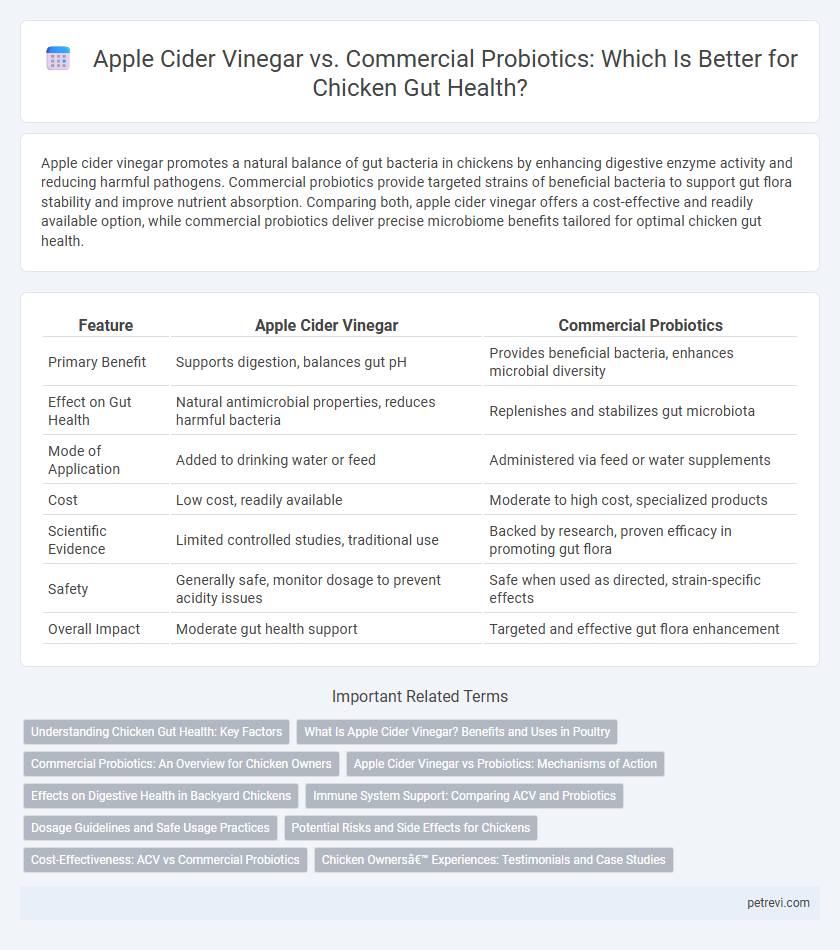Apple cider vinegar promotes a natural balance of gut bacteria in chickens by enhancing digestive enzyme activity and reducing harmful pathogens. Commercial probiotics provide targeted strains of beneficial bacteria to support gut flora stability and improve nutrient absorption. Comparing both, apple cider vinegar offers a cost-effective and readily available option, while commercial probiotics deliver precise microbiome benefits tailored for optimal chicken gut health.
Table of Comparison
| Feature | Apple Cider Vinegar | Commercial Probiotics |
|---|---|---|
| Primary Benefit | Supports digestion, balances gut pH | Provides beneficial bacteria, enhances microbial diversity |
| Effect on Gut Health | Natural antimicrobial properties, reduces harmful bacteria | Replenishes and stabilizes gut microbiota |
| Mode of Application | Added to drinking water or feed | Administered via feed or water supplements |
| Cost | Low cost, readily available | Moderate to high cost, specialized products |
| Scientific Evidence | Limited controlled studies, traditional use | Backed by research, proven efficacy in promoting gut flora |
| Safety | Generally safe, monitor dosage to prevent acidity issues | Safe when used as directed, strain-specific effects |
| Overall Impact | Moderate gut health support | Targeted and effective gut flora enhancement |
Understanding Chicken Gut Health: Key Factors
Chicken gut health relies on a balanced microbiome, efficient nutrient absorption, and strong immune function. Apple cider vinegar promotes beneficial bacteria through natural acids and prebiotics, enhancing digestive enzyme activity and pathogen resistance. Commercial probiotics deliver targeted strains of beneficial microbes, supporting gut integrity and reducing harmful bacteria to maintain optimal poultry health.
What Is Apple Cider Vinegar? Benefits and Uses in Poultry
Apple cider vinegar (ACV) is a natural fermented product derived from crushed apples, rich in acetic acid and beneficial enzymes that promote digestive health in chickens. Its antimicrobial properties assist in balancing gut microflora, reducing harmful bacteria, and enhancing nutrient absorption for improved growth and immunity in poultry. Regular use of ACV in drinking water supports pH regulation in the digestive tract, prevents infections, and can serve as a cost-effective alternative to commercial probiotics for maintaining optimal gut health.
Commercial Probiotics: An Overview for Chicken Owners
Commercial probiotics for chickens contain specific strains of beneficial bacteria designed to improve gut health, boost immunity, and enhance nutrient absorption. These products often include Lactobacillus and Bifidobacterium species, which help maintain balanced intestinal flora and reduce the risk of pathogenic infections. Unlike apple cider vinegar, commercial probiotics offer targeted microbial support with consistent dosing and scientifically-backed formulations tailored for poultry needs.
Apple Cider Vinegar vs Probiotics: Mechanisms of Action
Apple cider vinegar enhances chicken gut health by acidifying the digestive tract, promoting beneficial bacteria growth, and inhibiting pathogens through its acetic acid content. Commercial probiotics introduce specific strains of beneficial microorganisms directly into the gut, improving microbial balance and boosting immune responses. The acidic environment created by apple cider vinegar complements probiotics by supporting their colonization and activity within the chicken's gastrointestinal system.
Effects on Digestive Health in Backyard Chickens
Apple cider vinegar promotes beneficial gut bacteria and enhances nutrient absorption in backyard chickens, improving overall digestive health. Commercial probiotics provide targeted strains of beneficial microbes, leading to more consistent regulation of the intestinal flora. Studies show apple cider vinegar supports acidification of the gut, while probiotics specifically help restore microbial balance after antibiotic use or stress.
Immune System Support: Comparing ACV and Probiotics
Apple cider vinegar (ACV) enhances chicken gut health by promoting beneficial bacteria, which supports the immune system through improved nutrient absorption and pathogen defense. Commercial probiotics deliver targeted strains of live microbes that directly boost gut microbiota diversity and stimulate immune responses more rapidly. Both ACV and probiotics contribute to immune system support, but probiotics offer a more controlled and potent effect on gut microbial balance in poultry.
Dosage Guidelines and Safe Usage Practices
Apple cider vinegar can be added to chicken drinking water at a dosage of 1 tablespoon per gallon to support gut health, while commercial probiotics typically recommend dosages based on colony-forming units (CFUs), ranging from 1 to 5 billion CFUs per bird daily. It is crucial to monitor the birds for any adverse reactions and adjust doses accordingly, avoiding excessive vinegar concentrations to prevent irritation. Safe usage practices include rotating probiotics to maintain microbial diversity and ensuring vinegar solutions are freshly prepared to preserve their efficacy.
Potential Risks and Side Effects for Chickens
Apple cider vinegar, often used to promote chicken gut health, can cause irritation and disrupt the natural pH balance if overdosed, leading to digestive issues and weakened immunity. Commercial probiotics, while generally safe, may harbor contamination risks or cause imbalanced gut flora if not specifically formulated for poultry. Both treatments require careful dosage and quality control to avoid adverse effects such as diarrhea, reduced nutrient absorption, and overall decreased bird vitality.
Cost-Effectiveness: ACV vs Commercial Probiotics
Apple cider vinegar (ACV) offers a cost-effective alternative to commercial probiotics for improving chicken gut health, with a significantly lower price per dose while providing essential organic acids that promote beneficial gut bacteria. Commercial probiotics, although more expensive, deliver specific strains of live microorganisms that can target gut health more precisely, often requiring careful storage and handling. Evaluating cost-effectiveness involves balancing the lower upfront cost and ease of use of ACV against the targeted microbial benefits and potential higher efficacy of commercial probiotic supplements.
Chicken Owners’ Experiences: Testimonials and Case Studies
Chicken owners report that apple cider vinegar enhances gut health by promoting beneficial bacteria and improving digestion, leading to reduced diarrhea and better feed conversion rates. Case studies highlight commercial probiotics as effective in restoring microbial balance rapidly, especially after antibiotic treatments, with observable improvements in growth performance and immune response. Both methods demonstrate unique benefits, and many poultry keepers combine them to optimize gut flora diversity and overall bird vitality.
Apple Cider Vinegar vs Commercial Probiotics for Chicken Gut Health Infographic

 petrevi.com
petrevi.com